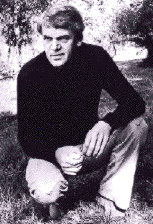 |
. . . She walked around the pool toward the exit. She passed the lifeguard, and after she had gone some three or four steps beyond him, she turned her head, smiled, and waved to him. At that instant I felt a pang in my heart! That smile and that gesture belonged to a twenty-year-old girl! Her arm rose with bewitching ease. It was as if she were playfully tossing a brightly colored ball to her lover. That smile and that gesture had charm and elegance, while the face and the body no longer had any charm. It was the charm of a gesture drowning in the charmlessness of the body. But the woman, though she must of course have realized that she was no longer beautiful, forgot that for the moment. There is a certain part of all of us that lives outside of time. Perhaps we become aware of our age only at exceptional moments and most of the time we are ageless. In any case, the instant she turned, smiled, and waved to the young lifeguard (who couldn't control himself and burst out laughing), she was unaware of her age. The essence of her charm, independent of time, revealed itself for a second in that gesture and dazzled me. I was strangely moved. And then the word Agnes entered my mind. Agnes. I had never known a woman by that name.
Immortality
The Czech writer Milan Kundera, b. Apr. 1, 1929, has lived in France since 1975, persuaded to self-exile by the censoring or suppression of his work by the government of his native country. Kundera has long denied any political motivation in his writings, however. His work is always humorous, skeptical, and fundamentally pessimistic in describing the universal human condition, whether under Communism or elsewhere. The Book of Laughter and Forgetting (1979; Eng. trans., 1980) is his most celebrated novel. Other highly regarded works include The Joke (1967; Eng. trans., 1982); Laughable Loves, a collection of short stories originally published in the 1960s (Eng. trans., 1974); Life Is Elsewhere (1969; Eng. trans., 1974); and The Unbearable Lightness of Being (1984; Eng. trans., 1984). In The Art of the Novel (1988), a collection of essays, Kundera repeats his conviction that the novel must be "autonomous," created independent of any system of political belief.
Text Copyright © 1993 Grolier Incorporated
"Modern stupidity means not ignorance
but the nonthought of received ideas."
Kundera on the Web
Milan Kundera at Amazon.Com
"But if God is gone
and man is no longer master,
then who is master?"
|


